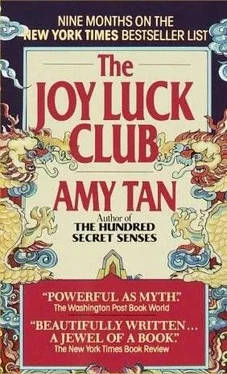Out in the front courtyard, I saw my mother kneeling, scratching the stone pathway with her fingers, as if she had lost something and knew she could not find it again. In front of her stood Uncle, my mother's brother, and he was shouting.
"You want to take your daughter and ruin her life as well!" Uncle stamped his foot at this impertinent thought. "You should already be gone."
My mother did not say anything. She remained bent on the ground, her back as rounded as the turtle in the pond. She was crying with her mouth closed. And I began to cry in the same way, swallowing those bitter tears.
I hurried to get dressed. And by the time I ran down the stairs and into the front room, my mother was about to leave. A servant was taking her trunk outside. My auntie was holding onto my little brother's hand. Before I could remember to close my mouth, I shouted, "Ma!"
"See how your evil influence has already spread to your daughter!" exclaimed my uncle.
And my mother, her head still bowed, looked up at me and saw my face. I could not stop my tears from running down. And I think, seeing my face like this, my mother changed. She stood up tall, with her back straight, so that now she was almost taller than my uncle. She held her hand out to me and I ran to her. She said in a quiet, calm voice: "An-mei, I am not asking you. But I am going back to Tientsin now and you can follow me."
My auntie heard this and immediately hissed. "A girl is no better than what she follows! An-mei, you think you can see something new, riding on top of a new cart. But in front of you, it is just the ass of the same old mule. Your life is what you see in front of you."
And hearing this made me more determined to leave. Because the life in front of me was my uncle's house. And it was full of dark riddles and suffering that I could not understand. So I turned my head away from my auntie's strange words and looked at my mother.
Now my uncle picked up a porcelain vase. "Is this what you want to do?" said my uncle. "Throw your life away? If you follow this woman, you can never lift your head again." He threw that vase on the ground, where it smashed into many pieces. I jumped, and my mother took my hand.
Her hand was warm. "Come, An-mei. We must hurry," she said, as if observing a rainy sky.
"An-mei!" I heard my aunt call piteously from behind, but then my uncle said, " Swanle! "-Finished!-"She is already changed."
As I walked away from my old life, I wondered if it were true, what my uncle had said, that I was changed and could never lift my head again. So I tried. I lifted it.
And I saw my little brother, crying so hard as my auntie held onto his hand. My mother did not dare take my brother. A son can never go to somebody else's house to live. If he went, he would lose any hope for a future. But I knew he was not thinking this. He was crying, angry and scared, because my mother had not asked him to follow.
What my uncle had said was true. After I saw my brother this way, I could not keep my head lifted.
In the rickshaw on our way to the railway station, my mother murmured, "Poor An-mei, only you know. Only you know what I have suffered." When she said this, I felt proud, that only I could see these delicate and rare thoughts.
But on the train, I realized how far behind I was leaving my life. And I became scared. We traveled for seven days, one day by rail, six days by steamer boat. At first, my mother was very lively. She told me stories of Tientsin whenever my face looked back at where we had just been.
She talked of clever peddlers who served every kind of simple food: steamed dumplings, boiled peanuts, and my mother's favorite, a thin pancake with an egg dropped in the middle, brushed with black bean paste, then rolled up-still finger-hot off the griddle!-and handed to the hungry buyer.
She described the port and its seafood and claimed it was even better than what we ate in Ningpo. Big clams, prawns, crab, all kinds of fish, salty and freshwater, the best-otherwise why would so many foreigners come to this port?
She told me about narrow streets with crowded bazaars. In the early morning peasants sold vegetables I had never seen or eaten before in my life-and my mother assured me I would find them so sweet, so tender, so fresh. And there were sections of the city where different foreigners lived-Japanese, White Russians, Americans, and Germans-but never together, all with their own separate habits, some dirty, some clean. And they had houses of all shapes and colors, one painted in pink, another with rooms that jutted out at every angle like the backs and fronts of Victorian dresses, others with roofs like pointed hats and wood carvings painted white to look like ivory.
And in the wintertime I would see snow, she said. My mother said, In just a few months, the period of the Cold Dew would come, then it would start to rain, and then the rain would fall more softly, more slowly until it became white and dry as the petals of quince blossoms in the spring. She would wrap me up in fur-lined coats and pants, so if it was bitter cold, no matter!
She told me many stories until my face was turned forward, looking toward my new home in Tientsin. But when the fifth day came, as we sailed closer toward the Tientsin gulf, the waters changed from muddy yellow to black and the boat began to rock and groan. I became fearful and sick. And at night I dreamed of the eastward-flowing stream my aunt had warned me about, the dark waters that changed a person forever. And watching those dark waters from my sickbed on the boat, I was scared that my aunt's words had come true. I saw how my mother was already beginning to change, how dark and angry her face had become, looking out over the sea, thinking her own thoughts. And my thoughts, too, became cloudy and confused.
On the morning of the day we were supposed to arrive in Tientsin, she went into our sleeping cabin wearing her white Chinese mourning dress. And when she returned to the sitting room on the top deck, she looked like a stranger. Her eyebrows were painted thick at the center, then long and sharp at the corners. Her eyes had dark smudges around them and her face was pale white, her lips dark red. On top of her head, she wore a small brown felt hat with one large brown-speckled feather swept across the front. Her short hair was tucked into this hat, except for two perfect curls on her forehead that faced each other like black lacquer carvings. She had on a long brown dress with a white lace collar that fell all the way to her waist and was fastened down with a silk rose.
This was a shocking sight. We were in mourning. But I could not say anything. I was a child. How could I scold my own mother? I could only feel shame seeing my mother wear her shame so boldly.
In her gloved hands she held a large cream-colored box with foreign words written on top: "Fine English-Tailored Apparel, Tientsin." I remember she had put the box down between us and told me: "Open it! Quickly!" She was breathless and smiling. I was so surprised by my mother's new strange manner, it was not until many years later, when I was using this box to store letters and photographs, that I wondered how my mother had known. Even though she had not seen me for many years, she had known that I would someday follow her and that I should wear a new dress when I did.
And when I opened that box, all my shame, my fears, they fell away. Inside was a new starch-white dress. It had ruffles at the collar and along the sleeves and six tiers of ruffles for a skirt. The box also contained white stockings, white leather shoes, and an enormous white hair bow, already shaped and ready to be fastened on with two loose ties.
Everything was too big. My shoulders kept slipping out of the large neck hole. The waist was big enough to fit two of me. But I did not mind. She did not mind. I raised my arms and stood perfectly still. She drew out pins and thread and with little tucks here and there stuffed in the loose materials, then filled the toes of the shoes with tissue paper, until everything fit. Wearing those clothes, I felt as if I had grown new hands and feet and I would now have to learn to walk in a new way.
Читать дальше












